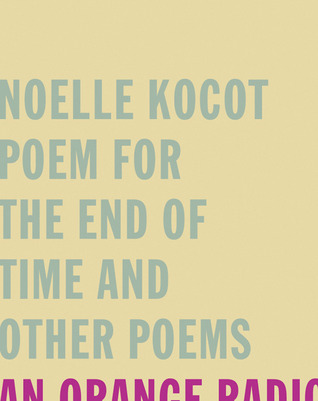An argument could be made that one of the dominant styles of post-M.F.A. poetry written during the last few years is a form of modest self-exposure—a confessionalism lite—that hinges on the disclosure of some quirky individual experience or character trait. Running parallel to this tendency is an unaffiliated group of poets (mostly women) writing a rawer version of personal expression. With three books published in the past five years, Noelle Kocot is one of the better-known— and just plain better—practitioners of this poetry.
Her previous books, 4 and The Raving Fortune, sonorously voiced difficult experiences as the tragedies endemic to families, friendships, and everyday life. Her latest, Poem for the End of Time and Other Poems, was published after the death of her husband, and the long title piece is dedicated to him.The book consists primarily of this poem plus a selection of shorter, relatively subdued—for Kocot—work. In “Palm Sunday,” she writes: “Words wait to be filled, as if they could / Digest their meanings’ absences / Without the call of being loved or understood.” These briefer poems are literally stunned by bereavement, which isn’t an absence of language, but the obscure reordering of its desire unfastened between past and future: “And for that which is not said / And for that which is already said / I lay down my head / To the very end of my silence,” Kocot avers in the opening poem, “Song.” This quieter approach performs a lyric penance without accompanying contrition.
On the other hand, “Poem for the End of Time”— which evokes her husband’s passing, the attacks of 9/11, the murder of Matthew Shepard, and a local-as-global apocalyptic mood—is the kind of vatic, incantatory, Ginsberg-indebted poem that doesn’t get written much these days, at least not by younger poets, and certainly not in an almost entirely unironic vein:
My neighborhood my neighborhood my neighborhood
Up in flames my neighborhood
There were jars turning black in my neighborhood
I saw smoke rising from them in my neighborhood
I was not stupid, my eyes were not blind
But Y o Y did I look back, pillar of Morton’s salt
Why did I bend to taste the sodden grass of the soul
Why did I leave You to go to that place
It was weird and cold and dark there
The Holy Spirit was there but I could not see it
It was darkly blue shining but I could not see it
And so on for over thirty (generously formatted) pages.
Some readers will be swept along in awe; for others, it will produce sporadic bouts of eye rolling. For most, it will probably be a combination of both. Nevertheless, there’s no denying the courage it takes to write a poem like this, and, more important, the skill and talent necessary to pull it off. Which is all the more reason why Kocot’s work should be read and talked about. Less a “Howl” for the present generation than a “Kaddish,” Kocot’s litany of death and loss— “This furnace of And,” she says in one of the book’s other poems—digs deep into personal and collective grief, where it finds an affirmation laced with a rejection of any easily learned lessons.





